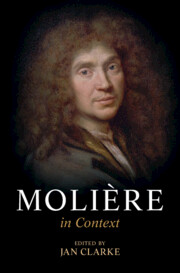Book contents
- Molière in Context
- Molière in Context
- Copyright page
- Dedication
- Contents
- Figures
- Charts and Tables
- Contributors
- Acknowledgements
- Translations
- Abbreviations
- Biographical Preface
- Part I Socio-Political Context
- Part II Intellectual and Artistic Context
- Part III Theatrical Context (Paris)
- Part IV Theatrical Context (Court)
- Chapter 18 Colbert, Cultural Policy and the Propaganda of Spectacle
- Chapter 19 The Decors of Comedy-Ballet: From the ‘Songe de Vaux’ to the ‘Rêve de Versailles’
- Chapter 20 Court Performances and Their Audiences
- Chapter 21 Music
- Chapter 22 The Livrets of Molière’s Plays
- Part V Reception and Dissemination
- Part VI Afterlives
- Further Reading
- Index
Chapter 20 - Court Performances and Their Audiences
from Part IV - Theatrical Context (Court)
Published online by Cambridge University Press: 10 November 2022
- Molière in Context
- Molière in Context
- Copyright page
- Dedication
- Contents
- Figures
- Charts and Tables
- Contributors
- Acknowledgements
- Translations
- Abbreviations
- Biographical Preface
- Part I Socio-Political Context
- Part II Intellectual and Artistic Context
- Part III Theatrical Context (Paris)
- Part IV Theatrical Context (Court)
- Chapter 18 Colbert, Cultural Policy and the Propaganda of Spectacle
- Chapter 19 The Decors of Comedy-Ballet: From the ‘Songe de Vaux’ to the ‘Rêve de Versailles’
- Chapter 20 Court Performances and Their Audiences
- Chapter 21 Music
- Chapter 22 The Livrets of Molière’s Plays
- Part V Reception and Dissemination
- Part VI Afterlives
- Further Reading
- Index
Summary
The court assembled around the prince consisted of his family and ministers, but also attracted all those who might need to seek royal authority for their own affairs. Molière was one of the King’s officers and was well acquainted with this milieu, which took form throughout the seventeenth century. During the first decades of his reign in particular, Louis XIV used entertainment to keep the members of his entourage in place by offering them opportunities to meet and experience his power in a pleasant way. The Parisian theatre troupes were regularly invited to appear before the King and Molière displayed a notable talent not only in presenting his own plays but also in combining within a single spectacle – the comedy-ballets, which were the highlights of these usually composite entertainments, and which were particularly well-suited to their context – spoken drama with music, meals, balls, and even fireworks. Devised to suit the individual circumstances, theatre could thereby offer a welcome moment of relaxation, particularly during the carnival period – a true breathing space in this environment where all was constrained according to the power relations in operation.
- Type
- Chapter
- Information
- Molière in Context , pp. 192 - 201Publisher: Cambridge University PressPrint publication year: 2022

